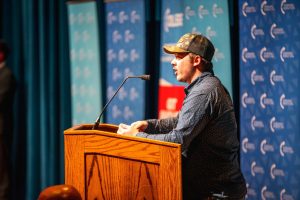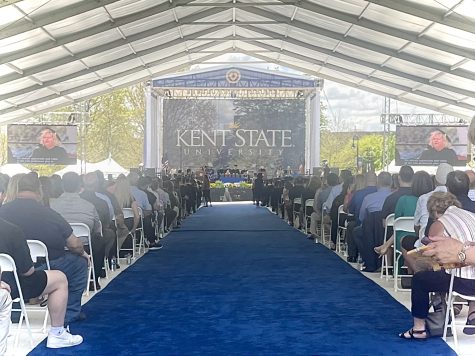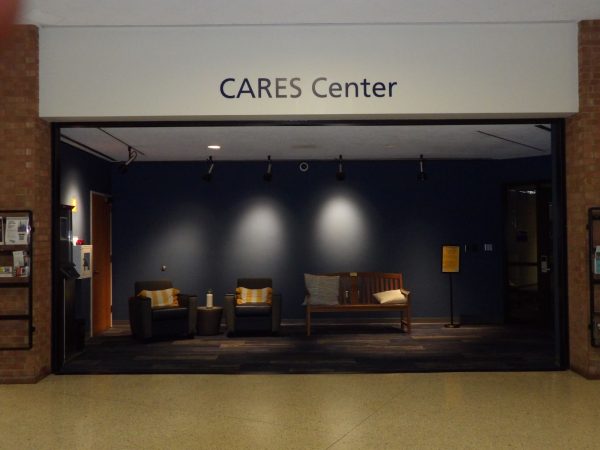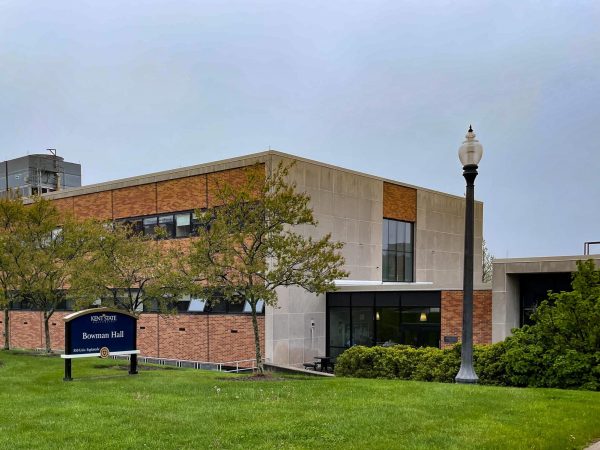May 4 Task Force hosts forum in honor of tragedy
May 4, 2012
An activist forum in commemoration of the 42nd anniversary of the May 4 shootings took place Thursday evening, exploring issues such as democracy, civil rights, progress and activism.
The forum, hosted by the May 4 Task Force, featured speakers such as Melba Beals of the “Little Rock Nine”, Sandy Rosen; a civil right attorney and lawyer for the students affected by the tragedy in 1977, Howie Emmer of activist activities, and Kent State anthropology professor Mark Seeman of the May 4 historic site preservation.
“How much has changed?” Beals asked her longtime friend Sandy Rosen as the two conversed and answered questions from the audience.
“A lot has changed; a lot still has to,” Rosen responded. “ I think that what is notable about the Occupy movement, as far as I can tell, no one has been killed yet by police forces.”
Rosen gave credit to technology, signalling to his camera phone, for keeping law enforcement in check when dealing with protests in any form.
The two sat adjacent to one another as they discussed where we are in terms of advocacy and civil rights, comparing the Little Rock incident and the Kent State shootings, citing them both as breaches in personal freedoms.
Beals then reflected on a time as a curious child, wandering into the bathroom labeled “whites only” and being arrested with her grandmother as a result.
“There was no eating out at a restaurant, there was no going to a movie, Beals said. “There was none of what we take for granted today.”
After receiving a bit of flattery about his work as an attorney for the afflicted students in 1970, Rosen took the opportunity to express his adoration for the everyday people who make this work possible. The victims of May 4 their family members are the real heroes, he said.
He also said that it was to the credit of the Kent State students in 1970 and beyond that changed what types of discipline, if any, is deemed socially appropriate when dealing with anyone exercising their right to peacefully assemble.
Beals suggested that all activists must harness the courage of inspirational figures such as Mahatma Gandhi and Martin Luther King Jr. in order fight apathy and ill-will.
Beals then expressed one of her most defining moments as an activist in which she received advice from Martin Luther King Jr. as a sixteen year-old at a recently desegregated Central High School.
“I remember Martin Luther King looking at me … and I remember telling him that I didn’t want to go back to Central High School. I was tired, someone had put acid in my eyes, I was beaten. You know what he said? He said: ‘Melba, Don’t be selfish.’”
The focus then shifted to civil rights on a large-scale after a student asked, “How do you feel about comparisons being made between the black movements and now the gay rights movement?”
Rosen told a brief story about a memorial for a friend who had died of AIDS years ago.
“We went to the memorial,” he said. “And a guy got up and walked slowly to the podium and said ‘…Everything that I’ve seen here today has made me realize the most important thing is to let people be themselves.’”
He said this stranger’s speech was something he found extremely profound.
The two ended their conversation on the sentiment: “Don’t let the world pass you by.”
Mark Seemen, a member of the committee responsible for getting the May 4 memorial site nominated and eventually inducted into the National Register of Historic Places, first discussed the long, sometimes gruelling process of getting the site included.
Seeman expressed how the May 4 shooting affected him as an undergraduate at Allegheny college, citing a friend of his who was deeply affected by the event as the cause of his commitment to the site’s historic preservation.
He briefly discussed his experience of the May 4 events.
“My first reaction was rage, anger and get even, Seemen said, “That quickly subsided when a friend of mine came to our apartment and he and his roommate had been kicked off the campus of Kent State University. He was destroyed, in shock, he was alternately swearing, cursing and crying. It had a lasting impact on me. It was that connection to May 4 that I still have.”
He said that when he arrived at Kent State for the first time as a professor in 1977, there was a “palpable cloud” hanging over the university the years following the shooting, that it had lost its integrity.
“It was a dishonored place,” he said. “It was hard to admit to my friends that I taught at Kent State University. I never went to a commemoration (of May 4) until 3 or 4 years ago. I didn’t want to participate, but gradually things changed for me. (Being on the board of governors) I was able to rub shoulders with a lot of people who had commitments to different preservation projects. It began to dawn on me that I had the ability to do this for Kent State.”
Seeman concluded his address by introducing the proposed May 4 Visitors center.
“By this time next year,” he said. “Kent State University will have a state-of-the-art, very impactful visitors center for May 4 1970. To contextualize it, and provide a frame of reference.”
























